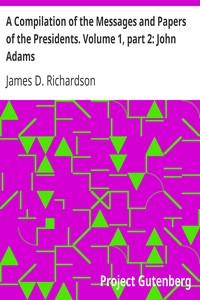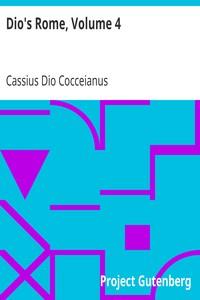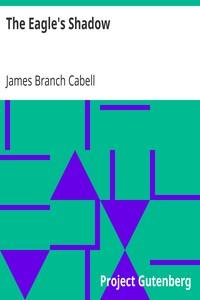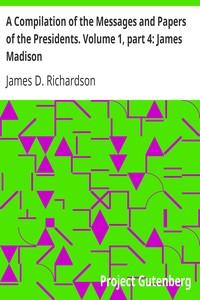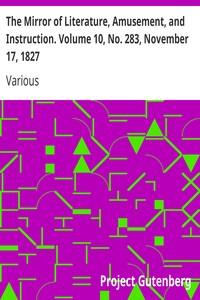|
|
Read this ebook for free! No credit card needed, absolutely nothing to pay.Words: 42775 in 18 pages
This is an ebook sharing website. You can read the uploaded ebooks for free here. No credit cards needed, nothing to pay. If you want to own a digital copy of the ebook, or want to read offline with your favorite ebook-reader, then you can choose to buy and download the ebook.

: A Compilation of the Messages and Papers of the Presidents. Volume 1 part 2: John Adams by Richardson James D James Daniel Editor - United States Politics and government; United States History Sources; Presidents United States; Adams John 1735-1826@FreeBooksTue 06 Jun, 2023 A COMPILATION OF THE MESSAGES AND PAPERS OF THE PRESIDENTS. BY JAMES D. RICHARDSON John Adams March 4, 1797, to March 4, 1801 John Adams John Adams was born on October 19 , 1735, near Boston, Mass., in the portion of the town of Braintree which has since been incorporated as Quincy. He was fourth in descent from Henry Adams, who fled from persecution in Devonshire, England, and settled in Massachusetts about 1630. Another of his ancestors was John Adams, a founder of the Plymouth Colony in 1620. Entered Harvard College in 1751, and graduated therefrom four years later. Studied the law and taught school at Worcester; was admitted to the bar of Suffolk County in 1758. In 1768 removed to Boston, where he won distinction at the bar. In 1764 married Abigail Smith, whose father was Rev. William Smith and whose grandfather was Colonel Quincy. In 1770 was chosen a representative from Boston in the legislature of Massachusetts. In 1774 was a member of the Continental Congress, and in 1776 was the adviser and great supporter of the Declaration of Independence. The same year was a deputy to treat with Lord Howe for the pacification of the Colonies. He declined the offer of chief justice of Massachusetts. In December, 1777, was appointed a commissioner to France, and returned home in the summer of 1779. He was then chosen a member of the Massachusetts convention for framing a State constitution. On September 29, 1779, was appointed by Congress minister plenipotentiary to negotiate a peace treaty with Great Britain. In 1781 was a commissioner to conclude treaties of peace with European powers. In 1783 negotiated with others a commercial treaty with Great Britain. Was one of the commissioners to sign the provisional treaty of peace with that nation November 30, 1782, and the definite treaty September 3, 1783. In 1784 remained in Holland, and in 1785 was by Congress appointed minister of the United States at the Court of Great Britain. He returned to his home in June, 1788. Was chosen Vice-President on the ticket with Washington, and on the assembling of the Senate took his seat as President of that body, at New York in April, 1789. Was reelected Vice-President in 1792. On the retirement of Washington in 1796 he was elected President, and was inaugurated March 4, 1797. He retired March 4, 1801, to his home at Quincy, Mass. In 1816 was chosen to head the list of Presidential electors of his party in the State. Was a member of the State convention to revise the constitution of Massachusetts; was unanimously elected president of that convention, but declined it on account of his age. His wife died in 1818. On July 4, 1826, he died, and was buried at Quincy. INAUGURAL ADDRESS. IN THE CITY OF PHILADELPHIA, PA When it was first perceived, in early times, that no middle course for America remained between unlimited submission to a foreign legislature and a total independence of its claims, men of reflection were less apprehensive of danger from the formidable power of fleets and armies they must determine to resist than from those contests and dissensions which would certainly arise concerning the forms of government to be instituted over the whole and over the parts of this extensive country. Relying, however, on the purity of their intentions, the justice of their cause, and the integrity and intelligence of the people, under an overruling Providence which had so signally protected this country from the first, the representatives of this nation, then consisting of little more than half its present number, not only broke to pieces the chains which were forging and the rod of iron that was lifted up, but frankly cut asunder the ties which had bound them, and launched into an ocean of uncertainty. The zeal and ardor of the people during the Revolutionary war, supplying the place of government, commanded a degree of order sufficient at least for the temporary preservation of society. The Confederation which was early felt to be necessary was prepared from the models of the Batavian and Helvetic confederacies, the only examples which remain with any detail and precision in history, and certainly the only ones which the people at large had ever considered. But reflecting on the striking difference in so many particulars between this country and those where a courier may go from the seat of government to the frontier in a single day, it was then certainly foreseen by some who assisted in Congress at the formation of it that it could not be durable. Negligence of its regulations, inattention to its recommendations, if not disobedience to its authority, not only in individuals but in States, soon appeared with their melancholy consequences--universal languor, jealousies and rivalries of States, decline of navigation and commerce, discouragement of necessary manufactures, universal fall in the value of lands and their produce, contempt of public and private faith, loss of consideration and credit with foreign nations, and at length in discontents, animosities, combinations, partial conventions, and insurrection, threatening some great national calamity. In this dangerous crisis the people of America were not abandoned by their usual good sense, presence of mind, resolution, or integrity. Measures were pursued to concert a plan to form a more perfect union, establish justice, insure domestic tranquillity, provide for the common defense, promote the general welfare, and secure the blessings of liberty. The public disquisitions, discussions, and deliberations issued in the present happy Constitution of Government. Free books android app tbrJar TBR JAR Read Free books online gutenberg More posts by @FreeBooks
: Dio's Rome Volume 4 An Historical Narrative Originally Composed in Greek During the Reigns of Septimius Severus Geta and Caracalla Macrinus Elagabalus and Alexander Severus: and Now Presented in English Form by Cassius Dio Cocceianus Foster Herbert Baldwi@FreeBooksTue 06 Jun, 2023

: The Eagle's Shadow by Cabell James Branch - Historical fiction; Fantasy fiction; Middle Ages Fiction Fantasy@FreeBooksTue 06 Jun, 2023
|
Terms of Use Stock Market News! © gutenberg.org.in2025 All Rights reserved.

